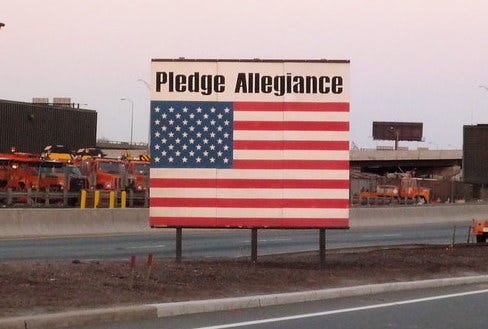
James Madison’s Memorial and Remonstrance Against Religious Assessments is one of the most famous defenses of religious liberty. Madison enlists a variety of arguments to critique a proposed tax supporting clergy. One of his most well-known lines asserts a priority to God that supersedes one’s allegiance to government:
It is the duty of every man to render to the Creator such homage and such only as he believes to be acceptable to him. This duty is precedent, both in order of time and in degree of obligation, to the claims of Civil Society. Before any man can be considered as a member of Civil Society, he must be considered as a subject of the Governour of the Universe.
This quote is often enlisted in arguments supporting religious freedom. But Madison’s argument raises another important question for people of faith: what happens when the state asks for unqualified loyalty?
In the News
Last month, the New York Times noted the passing of former federal judge Alfred T. Goodwin. In 2002, Judge Goodwin authored an appellate opinion declaring the Pledge of Allegiance unconstitutional for its phrase “one nation under God.” Two years later, the Supreme Court preserved the wording in the Pledge by dismissing the legal challenge on standing grounds (and vacating Judge Goodwin’s ruling).
The Times obituary for Judge Goodwin noted the swift and bipartisan reaction to the ruling, which came “amid a wave of patriotism in the wake of the terrorist attacks of Sept. 11, 2001”:
President George W. Bush called the ruling “out of step with the traditions and history of America.” Tom Daschle, the Senate Democratic leader, said, “This decision is just nuts.” The Senate passed a resolution, by a vote of 99-0, reaffirming the language of the pledge.
Despite the political support for the Pledge’s unifying language, Judge Goodwin seems correct to have noted that “in the context of the pledge, the statement that the United States is a nation ‘under God’ is a profession of a religious belief, namely a belief in monotheism.”
Perhaps just as troubling, the words spoken are a pledge of allegiance. In that context, one might question whether those who profess that the nation is one “under God” should pledge their allegiance to that nation. What would Madison think?
In My Head
Long before Judge Goodwin’s ruling—before the words “under God” were even part of the pledge—the Supreme Court issued one of its most important First Amendment decisions in West Virginia v. Barnette. The decision upheld the right of Jehovah’s Witnesses to refuse to participate in the pledge. I mentioned Barnette in an earlier post pointing to some of the dangers of patriotism.
I also teach Barnette in my course on Religion and the Constitution. As I prepared for class this year, I revisited Vince Blasi and Seanna Shiffrin’s essay about Barnette in First Amendment Stories. I’ve read this essay several times before but had missed an important observation in it: the Witnesses had proposed an alternate pledge.
The Witnesses’ brief notes that the students and their parents “attempted to have the flag-salute regulation changed” to allow different wording that would have been acceptable to them:
I have pledged my unqualified allegiance and devotion to Jehovah, the Almighty God, and to his Kingdom, for which Jesus commands all Christians to pray. I respect the flag of the United States and acknowledge it as a symbol of freedom and justice to all. I pledge allegiance and obedience to all the laws of the United States that are consistent with God’s law, as set forth in the Bible.
The Witnesses, it seems, took seriously Madison’s warning and wanted to ensure that their pledge reflected a proper ordering of their allegiances. Their brief notes that the West Virginia Board of Education refused this request and expelled the students. It took years of litigation, including an initial loss at the Supreme Court, for the Witnesses to be vindicated.
In the World
I have long been challenged by the writing of law professor Paul Kahn. In his book, Political Theology: Four New Chapters on the Concept of Sovereignty, Kahn asserts that “the state is not the secular arrangement that it purports to be” and “the state maintains its own sacred space and history.” He elaborates:
When modern revolutionaries took up the task of translating the felt meaning of political revolution into a constitutional order of law, they thought of themselves as men of the Enlightenment using the language of reason to push religion out of the public sphere. This hardly means that they neither experienced nor relied upon the sacred . . . . The state’s territory becomes consecrated ground, its history a sacred duty to maintain, its flag something to die for. None of this has much to do with the secular; these are matters of faith, not reason.
If Kahn is right that the state competes for sacred loyalty, then Judge Goodwin’s worry about the pledge may not go far enough: the allegiance demanded by the state may be as concerning as the profession of monotheism. On closer inspection, those who understand themselves to be subjects of the Governour of the Universe might find themselves more closely aligned with the position of the Jehovah’s Witnesses after all.






As always, a thoughtful and thought-provoking post. But I would advance an alternative defense of the Witnesses' objection: Rather than a competing consecrated ground, the state is inherently secularizing. Anything it enforces is necessarily subordinated to its secular ends. Even sincere invocations of religious commitment by the state or state actors are objectionable for at least three reasons: (1) the sanctity of the religious idea will be tainted if it is enforced by the state; (2) the citizens (whether in the religious community espoused or not) will have their religious liberty curtailed; and (3) any true patriotic enchantment, as Kahn describes, will be impossible--replaced by a politically useful caricature of religious sentiment.